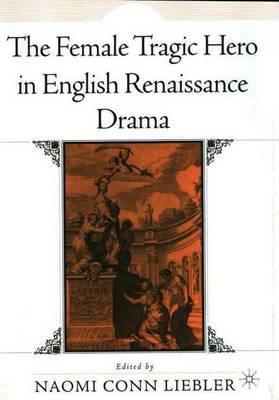Full Product Details
Author: N. Liebler
Publisher: St Martin's Press
Imprint: St Martin's Press
Dimensions:
Width: 14.00cm
, Height: 2.30cm
, Length: 21.60cm
Weight: 0.450kg
ISBN: 9780312220594
ISBN 10: 0312220596
Pages: 242
Publication Date: 15 July 2002
Audience:
College/higher education
,
Professional and scholarly
,
Undergraduate
,
Postgraduate, Research & Scholarly
Format: Hardback
Publisher's Status: Active
Availability: Out of stock

The supplier is temporarily out of stock of this item. It will be ordered for you on backorder and shipped when it becomes available.
Reviews
I welcome this exhilarating collection which restores the female tragic protagonist to her rightful place as hero. By asserting resemblances as well as differences between women and men, desire and virtue, private and public, authors and audiences, victims and heroes, the volume compellingly challenges longstanding assumptions. The strong voices of the wonderful introduction and the individual essays collectively reframe our understanding of Renaissance tragedy by drawing on old and new contexts in startling ways: Greek tragedy, visual arts, Neoplatonic humanism, Attic and near eastern mythology, medieval morality plays, Morris dancing. The book is essential reading for scholars, students, and playgoers. - - Carol Thomas Neely, Professor of English, University of Illinois at Urbana-Champaign If, as Naomi Conn Liebler says, tragedy tells the tale of a culture in crisis , this book retells some of the most compelling tales of early modern culture from a feminine perspective. In this set of diverse, scholarly, and vigorously political essays, Renaissance tragic drama is explored as a site of gendered struggle, resistance, and challenge. The Female Tragic Hero in English Renaissance Drama powerfully demonstrates how attending to female agency can revise our understandings of cultures and their crises. - - Kate Chedgzoy, Professor of Renaissance Literature, University of Newcastle
I welcome this exhilarating collection which restores the female tragic protagonist to her rightful place as hero. By asserting resemblances as well as differences between women and men, desire and virtue, private and public, authors and audiences, victims and heroes, the volume compellingly challenges longstanding assumptions. The strong voices of the wonderful introduction and the individual essays collectively reframe our understanding of Renaissance tragedy by drawing on old and new contexts in startling ways: Greek tragedy, visual arts, Neoplatonic humanism, Attic and near eastern mythology, medieval morality plays, Morris dancing. The book is essential reading for scholars, students, and playgoers. ----Carol Thomas Neely, Professor of English, University of Illinois at Urbana-Champaign If, as Naomi Conn Liebler says, 'tragedy tells the tale of a culture in crisis', this book retells some of the most compelling tales of early modern culture from a feminine perspective. In this set of diverse, scholarly, and vigorously political essays, Renaissance tragic drama is explored as a site of gendered struggle, resistance, and challenge. The Female Tragic Hero in English Renaissance Drama powerfully demonstrates how attending to female agency can revise our understandings of cultures and their crises. ----Kate Chedgzoy, Professor of Renaissance Literature, University of Newcastle
I welcome this exhilarating collection which restores the female tragic protagonist to her rightful place as hero. By asserting resemblances as well as differences between women and men, desire and virtue, private and public, authors and audiences, victims and heroes, the volume compellingly challenges longstanding assumptions. The strong voices of the wonderful introduction and the individual essays collectively reframe our understanding of Renaissance tragedy by drawing on old and new contexts in startling ways: Greek tragedy, visual arts, Neoplatonic humanism, Attic and near eastern mythology, medieval morality plays, Morris dancing. The book is essential reading for scholars, students, and playgoers. - - Carol Thomas Neely, Professor of English, University of Illinois at Urbana-Champaign If, as Naomi Conn Liebler says, tragedy tells the tale of a culture in crisis, this book retells some of the most compelling tales of early modern culture from a feminine perspective. In this set of diverse, scholarly, and vigorously political essays, Renaissance tragic drama is explored as a site of gendered struggle, resistance, and challenge. The Female Tragic Hero in English Renaissance Drama powerfully demonstrates how attending to female agency can revise our understandings of cultures and their crises. - - Kate Chedgzoy, Professor of Renaissance Literature, University of Newcastle
I welcome this exhilarating collection which restores the female tragic protagonist to her rightful place as hero. By asserting resemblances as well as differences between women and men, desire and virtue, private and public, authors and audiences, victims and heroes, the volume compellingly challenges longstanding assumptions. The strong voices of the wonderful introduction and the individual essays collectively reframe our understanding of Renaissance tragedy by drawing on old and new contexts in startling ways: Greek tragedy, visual arts, Neoplatonic humanism, Attic and near eastern mythology, medieval morality plays, Morris dancing. The book is essential reading for scholars, students, and playgoers. - - Carol Thomas Neely, Professor of English, University of Illinois at Urbana-Champaign If, as Naomi Conn Liebler says, tragedy tells the tale of a culture in crisis , this book retells some of the most compelling tales of early modern culture from a feminine perspective. In this set of diverse, scholarly, and vigorously political essays, Renaissance tragic drama is explored as a site of gendered struggle, resistance, and challenge. The Female Tragic Hero in English Renaissance Drama powerfully demonstrates how attending to female agency can revise our understandings of cultures and their crises. - - Kate Chedgzoy, Professor of Renaissance Literature, University of Newcastle
Author Information
Naomi Conn Liebler is Professor of English and Distinguished Scholar at Montclair State University. She is author of Shakespeare’s Festive Tragedy: The Ritual Foundations of Genre.



